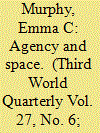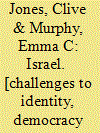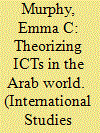|
|
|
Sort Order |
|
|
|
Items / Page
|
|
|
|
|
|
|
| Srl | Item |
| 1 |
ID:
074912


|
|
|
|
|
| Publication |
2006.
|
| Summary/Abstract |
Recent political reforms in the Gulf Arab countries have been variously understood as regime survival strategies, correlates of economic globalisation, and even the end result of US pressure to democratise. This paper examines the possible role played by the introduction of modern information and communication technologies (icts) in stimulating political liberalisation in the Gulf Arab states. Rather than attempting to quantify their democratising impact, this paper utilises the concept of agency, examining how the range of agents of ict production and diffusion in the region have sought to influence the actual impact upon political space. It concludes that modern icts have demonstrated the potential to expand the existing public sphere, and to create new opportunities for liberal political activity. However, the particular configuration of agency in the countries in question has meant that the state and its allies have retained a significant degree of control over the extent and nature of the political space, a process in which local society may have in some instances collaborated. Thus, while the introduction and diffusion of new icts may have contributed to the pressures which led to some of the political reforms in evidence in the Gulf Arab states, one cannot argue that they amount, at least as yet, to a sustained and effective attack on illiberal political structures. The first part of this paper surveys the existing body of literature in an effort to devise a framework for the subsequent study of two principal contemporary icts (satellite television and the internet) in the Gulf Arab states.
|
|
|
|
|
|
|
|
|
|
|
|
|
|
|
|
| 2 |
ID:
106659


|
|
|
|
|
| Publication |
2011.
|
| Summary/Abstract |
This study examines how Arab states have constructed national regulatory regimes for satellite television and telecommunications which undermine or inhibit the emergence of the three normative requisites for a civil political culture: freedom, equality and tolerance. Drawing on case studies of Jordan, Egypt and the UAE, the study argues that, by failing to be either self-limiting or to protect civil society from its uncivil components in the new communicative spaces provided by these technologies, the Arab states are attempting to reconstruct their own dominant (new) media spaces and so prevent the conditions which might foster democratic political cultures of civility.
|
|
|
|
|
|
|
|
|
|
|
|
|
|
|
|
| 3 |
ID:
046505


|
|
|
|
|
| Publication |
London, Routledge, 2002.
|
| Description |
xxv, 146p.
|
| Series |
Contemporary Middle East
|
| Standard Number |
041527088X
|
|
|
|
|
|
|
|
|
|
|
|
Copies: C:1/I:0,R:0,Q:0
Circulation
| Accession# | Call# | Current Location | Status | Policy | Location |
| 045365 | 320.95694/JON 045365 | Main | On Shelf | General | |
|
|
|
|
| 4 |
ID:
092346


|
|
|
|
|
| Publication |
2009.
|
| Summary/Abstract |
The concept of the public sphere has become a commonly used paradigm for understanding the impact of contemporary Information and Communications Technologies (ICTs) on the political spaces of the Arab world. This article aims to explore the multiple understandings of this evolving public sphere and their shortcomings. A survey of recent research on the Arab region demonstrates inconsistencies which have arisen from an abstraction of the concept from its theoretical roots. By returning to the discourse surrounding Habermas' original ideas, including the debates which have articulated concerns arising from the possibilities of multiple and non-virtuous publics, the (re)mediating effects of contemporary ICTs, the possibilities for the social construction of new identities, and the universalism of the normative underpinnings of the public sphere, the emerging Arab public sphere is located within its global counter-part, high-lighting those of its features which represent opportunities for new forms of communicative action which have emancipatory potential. However, the article acknowledges the mutually constitutive functions of structure and identity by further locating the new landscape of intra-regional communication within the context of the global spread of informational capitalism. The evidence here suggests that the emerging Arab public sphere is already penetrated and diminished. The key to reconciling these apparently contradictory tendencies lies in the porousness of the boundaries which delimit the Arab public sphere and the manner in which it retains some autonomy from its global counterpart.
|
|
|
|
|
|
|
|
|
|
|
|
|
|
|
|
|
|
|
|
|